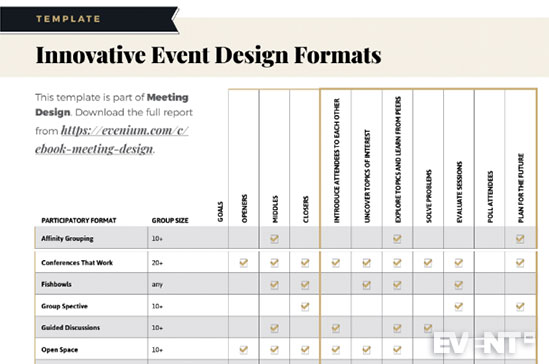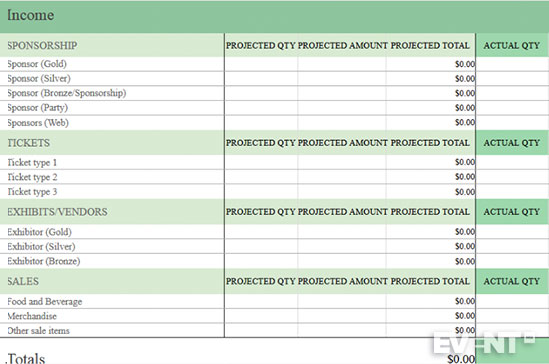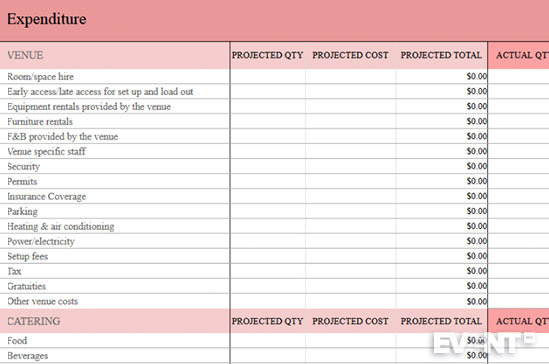Skift Take
Whether you've planned 200 events or you're just starting, we can both agree on one thing: event planning is hard work.
And the pressure to get better at it every year is real. Your willingness and ability to adapt to the demand for a more strategic planner with more responsibilities is real. With the events landscape changing constantly, event professionals need to learn to take advantage of every tool at their disposal.
-
Planning an outdoor event?
Check out our article, The Best Outdoor Activities for Team Building (With Planner Checklist] — produced together with experts at the Arizona Office of Tourism, it includes 3 checklists covering 17 must-know points that could make or break your event.
To help you cope with the increasing demands of your role and guide you through the execution of your event, we’ve compiled a number of checklists covering various stages of the event planning process. Use these to make sure you’ve covered all your bases from sourcing the right technology to planning for every eventuality.
Here’s an overview of the 19 checklists we’ve prepared for you:
| BEFORE THE EVENT | DAY OF THE EVENT | POST-EVENT |
Before the Event Checklists: Planning and Best Practices
Once you’ve got the go-ahead to take on your client’s event, you need to start quickly. You should start the tasks below at least 4 to 6 months before the event. The faster you begin the better!
The tasks are divided into 8 phases:
Project Management and setting up |
Venue Research and Contracting |
Registration and ticketing |
Sourcing partners and vendors |
Sponsorship |
Marketing |
Communications |
Health and safety |
-
Project Management and Setup
Event planners are (or should be) natural project managers, but event the best can benefit from a little help.
Here is your high-level event to-do list for executing proper project management and setup:
- Set your event budget, objectives, schedules, and deadlines
- Identify key staff responsibilities and roles
- Set milestones and crucial deadlines that must be met
- Allocate individual tasks and action items
- Agree on expected team communication, meeting times, and reporting timeline
- Always work with an updated budget and use estimates until the correct prices are confirmed
- Identify overspends and come up with a plan to minimize costs
Here is a ready-made template for you to use:

-
Venue Research and Contracting
- Create a shortlist of potential locations and venues
- Confirm availability and pricing
- Organize visits to prospective venues
- Negotiate and sign a contract with the venue chosen
- Have a critical look at how the event will work on the site
- Create room allocations and space layouts
- Get the team familiarized with specifics, loading in/out, unloading, parking, space, etc.
- Test event venue WiFi bandwidth and find alternatives or upgrade it if necessary
-
Registration and Ticketing
-
85% of all event planners use event registration software. And 59% of event organizers state that their use of event tech will increase. – 100 Event Statistics (2019 Edition)
As you can see, making sure that your event planning checklist for registration includes provisioning for registration software is in your best interest.
Here’s the event registration checklist:
- Create a shortlist of event registration platforms with mobile responsive capabilities as a requirement
- Get a sign-off from the senior management and legal team on the software chosen
- Set up an online registration process for the event, even if the event is free
- Test the registration flow to ensure that everything is working properly
- Set a deadline for the ticketing process and confirming attendance
- Establish registration confirmations that include all the information needed to attend
-
Sourcing for Partners and Vendors
Once you’ve handled your event planning checklist for registrations and ticketing, you can start sourcing for partners and vendors.
Here are the things you’ll need to cover:
- Confirm the availability of speakers, special guests, and performers
- Coordinate accommodation for guests and travel plans if applicable
- Ensure you communicate expectations with all partners, exhibitors, and stakeholders in advance
- Speak to vendors to get purchase advice for your budget and confirm prices
- Make sure all relevant people have the date of the event on lockdown
- Sign every agreement and contract made with vendors once specifics are confirmed
-
Sponsorship Overview Checklist
Event sponsorship is a big deal, but almost half (49%) of event professionals thought that their biggest challenge was finding sponsors.
-
Almost half (49%) of event professionals thought that their biggest challenge was finding sponsors. –Event Sponsorship: 117 Ideas and Trends To Get More Sponsors in 2019
To get you started on the right path, here is an overview of the tasks you need to complete to win sponsorship:
- Get familiar with current sponsorship trends
- Target prospects that currently sponsor events
- Carry out in-depth market research on your sponsor
- Study your prospects’ overall objectives and brand values
- Pitch in innovative ideas to your sponsor based on the results of your research
- Allow minor compromises in your offer
- Draft quality proposals
- Deliver the proposals in advance and, if possible, in person
- Keep consistent communication with the sponsor to solidify contact and trust
-
Marketing Event Checklists
Your challenge in event marketing is to position your event value to your audience in a way that resonates with them and reaches the most (and most qualified) prospective attendees.
Moreover, with the massive shift in corporate marketing budgets to events, planners’ marketing efforts are being held to an especially high standard – particularly when it comes to tracking and analyzing marketing ROI.
-
The event planner-turned-marketing strategist is now required to provide a framework of KPIs and other metrics that allow them to measure their event marketing activations and make their performance tangible. – From Event Planner to Event Strategist, 2019
The benefit of using data to get your event marketing plan right is that it substantiates in a clear, actionable way why you should pursue the marketing efforts you pursue. A good promotional strategy will pull in event registrations, build a solid contact base, and secure brand recognition.
With that said let’s see what your event planning checklist should cover:
- Identify why people should attend the event, why the event is important to the target audience, and what value the customer will gain from the event
- Identify your event marketing objectives
- Ensure your marketing objectives are precise, actionable and relevant to the overall goal of the event (i.e. establish marketing KPIs)
- Create audience personas focused on how they consume content, when you interact with them, what social media platforms and technology they use, as well as consumer key influencers
- Map both customer and stakeholder touch point journeys, including search engine presence, event app and website, social media profiles, etc.
- Schedule marketing activities based on customer/stakeholder key times, dates
- Use previous event videos, relevant landing pages and informative ads to educate your target audience about the benefit of the event.
- Review marketing plan success with web analytics and A/B tests, modifying as needed
- Assess the success of your marketing efforts from previous years, gleaning any lessons or insights from those campaigns to apply to this and future campaigns
-
How to plan an Event with Proper Social Media Marketing
Social media is an unavoidable part of event marketing but it’s also a tough one as 51% of event planners reveal that they struggle with how to use it effectively for marketing their events.
So you need to have an event planning to-do list for your social media marketing, and here it is:
- Identify the main objectives areas
- Map out your processes
- Identify what content you will include
- Choose your major content types
- Know why you opted for that content type
- Specify your audience
- Create rules and guidelines on the tone and style you want the team to embrace when on social media
For your social media content, follow these guidelines:
- Include a call to action on your social media images
- Use video content
- Post different types of content
- Optimize your pages for common mobile devices
- Include event live stream to your social media profile
- Add podcasts to your content types
-
Event Communications Checklist
Smooth communication with key members of your team is crucial for everything to work out as planned.
There needs to be consistency in the information you communicate both internally and to your attendees, which can be a challenge when you also have to find an efficient way to disseminate it.
To ensure quality internal and external communication, use this event planning checklist:
- Create a strategy to follow up on RSVP’s and boost ticket sales
- Make pre-event information available for attendees, both indirectly on the web and through direct communications, alerts, emails, etc.
- Have a communication plan for your onsite team members
- Identify the fastest way to communicate with key people on the day of the event
- Create a strategy to handle issue escalations
-
Health and Safety Event Planner Checklist
As an event planner, one of your most important duties is to care for both your staff and attendees. Paying attention to the health and safety of all participants is especially crucial at big events.
This means you need to take reasonable preventive steps to make sure no one gets hurt, and you should have a plan in case of any emergencies that may arise.
Here is what your health and safety event to-do list should include:
- Ensure that you’ve gotten the relevant permits, licenses, and insurance cover for the event
- Arrange for security personnel to be onsite to carry out security, bag checks, etc.
- Go over the risk assessments, insurance documents and method statements from vendors, performers, exhibitors, etc.
- Identify potential risks and create a risk assessment
- Have a contingency plan
- Share copies of your contingency plan and risk assessment to key players of your event
-
Technology Event Planning Checklist
From registration and event management software to onsite engagement, event planning technology is an absolute necessity if you want to have a hitch-free event.
Apart from improving everything from data integrity to networking and lead generation opportunities, technology allows you to cut down on the more menial aspects of event planning so you can concentrate on the creative and strategic side.
Moreover, attendees are used to a technologically facilitated life, and expect many aspects of the event and their interaction with it to be managed through their smartphones. This is why 91% of event organizers believe that event apps are still relevant to their events and 75% of event professionals who don’t use them stated that they would adopt them.
These stats point to one thing: you need to incorporate event technology to your event and have it ticked on your event planning checklists.
To properly harness the power of event tech, use this checklist:
- Research the options you have for event technology, view demos of the tech in use, and get price quotes from suppliers
- Create a shortlist and secure approval for the best option
- Brief relevant stakeholders about the benefit and purpose of the technology you’ve opted for
- Onboard your staff on how to effectively use the tech
- Set up the event tech, making sure the venue has the right infrastructure
- Implement usage of the tech and let attendees know that the tech is available
- Offer tech support to encourage consumer usage and maximize ROI
-
Event Checklist for Audio Visual (AV)
Top-notch event AV is vital to a successful event, and not just because the quality makes the event a memorable one for attendees. People tend to quickly notice if something seems off and one single mistake could ruin the event for them.
Follow this checklist to ensure that you don’t miss anything:
- Book and confirm that you’ll have the right audio-visual tech and tools on the day of the event
- If you’re using with platform or stage, ensure that it can accommodate the AV pieces you’ve opted for
- Preview all graphics, presentations, and visuals as you set them up
- Cross-check the number of microphones available and know when mic changeovers will happen
- Set a specific date and time when the AV team will be able to set up the necessary pieces of equipment
- Schedule rehearsals/run-throughs and ensure they take place at the allocated time
- Set contingency plans in place in case of technical issues
- Carry out final tests and checks
- Introduce speakers, performers to your audiovisual team and senior management of the event
- Check lighting, presentations, videos, technology, and sound during briefing and rehearsals
- Agree and confirm speaker audiovisual specifics
- Once a speaker or performer arrives at the event, check the person as available
-
Event Planning Budget Checklist
It may seem like a daunting task to pull together an event budget, but as long as you craft one that’s feasible and include contingencies in case of emergencies, you’re off to a good start.
Here’s what you should have ticked on your event planning budget checklist:
- Identify what you’re budgeting for by figuring out what periods of your events would most likely incur costs
- Use a spreadsheet – an excellent choice is Google sheet because it allows your whole planning team to view it simultaneously and keeps a record of all changes
- Alternatively, look into using budgeting software if you’re creating a complex budget
- Include line details for every item
- Know your deadlines for expected payments
- Separate your budget sheet into income and expenditure so you can easily track each and determine if you’re running a deficit
Check out this example:

More:

Day of the Event Checklist: Final Checks and Greeting Guests
It’s the day of the event, and there’s never been a better time to have your conference planning checklist handy to guide you towards success. To make sure you can hit the ground running when the doors open, ensure you’ve got these 4 steps covered:
Conduct final checks |
Check-ins and meet and greet |
Catering |
Health and Safety |
-
Final Checks Event Planning Guide
- Double-check that you’re ready for the number of people expected, from the number of check-in kiosks to chairs in the keynote address
- Check that the necessary components are available in the relevant rooms
- Check all branded items and make sure that they are properly designed and placed
- Test WiFi connectivity
- Run through set timings with your team
- Check that the restrooms are clean and operational; the gents and ladies should have toilet rolls, soap, towels or dryers available
- Check-in with all event suppliers that they are set and there are no complications
-
Check-In / Meet and Greet Checklist
- Talk to all event registration staff and make sure they’re fully aware of where VIPs, attendees, and presenters should be directed
- Place staff in place to welcome important persons and lead them to where they are meant to be or who they are supposed to meet
- Ensure communication is in place to notify staff when key people arrive so they can properly receive them
- Test your tools: tablets, badge printers, barcode scanners, and facial recognition software
-
Catering Event Planning Checklist
- Run through the details with your catering manager and confirm dietary requirements for specific guests
- Take a minute to discuss any last-minute changes
- Check that presenters, speakers, and performers have water available both onstage and backstage
- Determine what should happen to surplus food
-
Onsite Health and Safety Checklist
- Do a final safety check in the venue
- Make sure that you have signed all safety paperwork from the venue electrician, exhibitors, and the AV team, etc.
- Confirm that fire alarms are in good shape and working
- Make sure you are on the same page as the venue regarding any evacuation and emergency procedures, and that you have established an efficient and effective way to communicate those instructions to event-goers
- In case hazards do occur, be prepared to note down in full the details of the incident and get the contacts of the persons involved
Post-Event Planning Checklist: Feedback, Tear-down and Post-event Engagement
The event may be over, but your job as an event planner isn’t. There are still a number of tasks you need to tick off your event checklist. At this point, you need to tie in all loose ends and get feedback from various key players.
Do this in 3 steps:
Project management
Presenters and vendors/suppliers
Sales
-
Post-event Project Management Checklist
- Get feedback from relevant stakeholders and team members immediately
- Have a debrief meeting with venue staff
- Tally all bills and check against your agreements with vendors, suppliers, and the venue
- Analyze and measure all data gotten
- Check that all event objectives were met
- Send out follow-up messages to communicate any surveys, post-event networking opportunities, or other instructions
- Finalize your budget
-
After the Event: Presenter and Vendors / Suppliers Checklist
- Thank all performers, exhibitors, and presenters and share follow up information with them, like images and session feedback
- Thank suppliers and get feedback from them
- Report and analyze all feedback for future improvements
- Cross-check the final invoices from vendors against your contracts
-
Sales Event Planning Checklist
- Have guidelines for what makes a qualified lead
- Segment leads into predetermined criteria for qualification
- Pass on qualified leads from events to sales or lead nurturing programs
IN CONCLUSION
Event planning can be really draining, especially when you don’t have the right things in place at the right time. Following this ultimate event checklist, you’ll be able to have a smooth transition from starting your event business to executing post-event sales.





